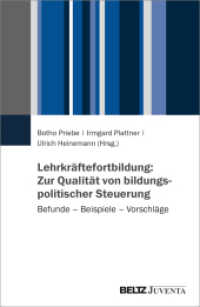- ホーム
- > 洋書
- > 英文書
- > Politics / International Relations
Full Description
This book challenges the common image of the European Commission as an insulated technocracy immune to political pressures. Based on an innovative combination of public opinion, protest and media data, it first demonstrates that European integration has become increasingly politicised since the 1990s. Against this background, the Commission is now much more concerned about the public appeal of its policies. That, however, challenges and contradicts the well-worn patterns of supranational regulation in Europe. Rauh systematically compares 17 legislative drafting processes in consumer policy between 1999 and 2009. Based on first-hand insider accounts of involved officials, his analysis indicates that the Commission's policy choices indeed become more consumer friendly under higher levels of public awareness. While this improves the democratic quality of European decision-making, the book also reveals an enhanced conflict potential within the Commission and beyond which threatens to undermine the efficiency of legislative decision-making in the EU.
Contents
List of Abbreviations ix
List of Figures and Tables xi
Acknowledgements xiii
Chapter One – Introduction 1
Chapter Two – The Public Politicisation of European Integration 7
Chapter Three – Politicisation and Consumer Policy Formulation in the
European Commission 27
Chapter Four – Economic and Contractual Consumer Rights 59
Chapter Five – Product Safety 127
Chapter Six – Food Safety 173
Chapter Seven – Conclusions: The Commission's Agenda-Setting
Activity in a Politicised Context 223
Appendix A: Additional Analyses of the Politicisation Index 243
Appendix B: Sampling Consumer Policy Initiatives 247
Appendix C: Operationalising Issue Salience 249
Appendix D: Interviews with Commission Officials 259
Appendix E: Assessing Consumer Interventionism in Commission
Proposals 261
Bibliography 269
Index 301







